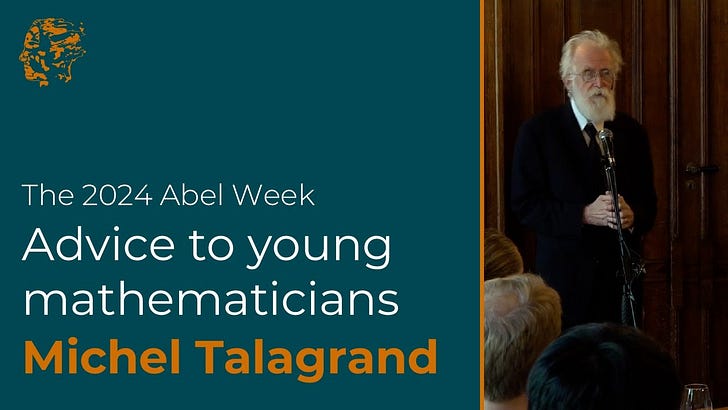Michel Talagrand: Advice to Young Mathematicians
Fantastic advice by an Abel prize winner to young mathematicians.
I recently watched a very inspiring video containing advice by a world-renowned mathematician Michel Talagrand which I decided to share and which I hope inspires others:
Talagrand studied functional analysis, then probability and its applications until he retired in 2017. He received the prestigious Abel prize in 2024. The key to his success was his ability to connect geometric ideas to various abstract and probabilistic notions. I won’t waste too much time writing about his work – instead I’ll link an outstanding article which already provides an excellent overview of his life and work:
Michel Talagrand Wins Abel Prize for Work Wrangling Randomness
Some Key Quotes on Talagrand:
Talagrand’s mathematical style is atypical. He does not mind studying small problems as stepping stones to further significant discoveries. He has himself written of his method that: “it helps to be humble and to start by understanding fully the simple situations. When working on a conjecture I also found it helpful to alternatively try to prove it and try to disprove it. The progress comes by jumps, much like matching two pieces of a puzzle. This is nearly instantaneous. Now you see it, and the moment before you did not. After such progress, you may have a much clearer vision of the problem.” - Michel Talagrand: A brief biography
“I’m not able to learn mathematics easily. I have to work. It takes a very long time and I have a terrible memory. I forget things. So I try to work, despite handicaps, and the way I worked was trying to understand really well the simple things. Really, really well, in complete detail. And that turned out to be a successful approach.” - Why 2024 Abel prize winner Michel Talagrand became a mathematician
“I like to understand simple things very well, because my brain is very slow,” Talagrand said. “So I think about them for a very, very long time.” He’s driven, he said, by the desire to “understand something deeply, in a pure way, which makes the theory much easier. Then the next generation can start from there and make progress on their own terms.” - Michel Talagrand Wins Abel Prize for Work Wrangling Randomness
And last but not least – a key highlight from his speech:
“Of course, I would like to encourage you to keep doing mathematics. I think being a mathematician is the nicest job on Earth. That's why I did it … and…but the bad news is nothing comes for free ever and you have to really commit yourself entirely if you want to succeed unless you are somebody like Abel, happens every once every hundred years. But for one I understand, Abel … even Abel worked very hard at what he was doing. So there is no magic and if you are not Abel, you have to work even harder and also you have to be persistent. Things don't come so easily.
When I started doing mathematics, so I was a student, I didn't know anything at all and I arrived in a seminar where people have been doing this kind of stuff for years and I see there and I have no idea what they talk about and this lasted maybe something like a year. And there is no easy solution because I say, okay, give me papers that I can read. And then I look at the paper and the introduction, they mention ten other papers of which I have no idea. So it's sort of difficult to start. So you have to focus on something special and then you understand it and then you feel more comfortable and then you expand your knowledge. The important thing is don't get discouraged at the beginning. That's a part where you are the more fragile. Once you are started having achieved something somewhere, however small it gives you courage and energy.”
A great message and story by a fantastic mathematician.



